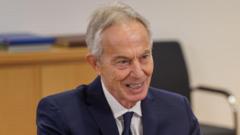Could Tony Blair Lead a Transitional Authority in Gaza?

Published: 2025-09-26 06:30:23 | Category: world
The former UK Prime Minister Sir Tony Blair has entered discussions regarding the potential establishment of a transitional authority in Gaza, contingent upon the achievement of a ceasefire. This initiative, which has garnered attention, is reportedly supported by various parties and aims to create a stable governance structure in the region.
Last updated: 14 October 2023 (BST)
Key Takeaways
- Sir Tony Blair is in talks about leading a transitional authority in Gaza.
- The proposal involves UN backing and support from Gulf states.
- Palestinian President Mahmoud Abbas is open to a two-state peace plan.
- Hamas's future role in governance is rejected by Abbas.
- Recent violence has led to significant casualties in Gaza.
Context of the Discussions
The ongoing conflict in Gaza has escalated dramatically following the Hamas-led attack on southern Israel on 7 October 2023, which resulted in the loss of approximately 1,200 lives and 251 hostages taken. In retaliation, Israel has conducted extensive military operations in Gaza, leading to a staggering death toll of at least 65,419 people, as reported by the Hamas-run health ministry. Amidst this turmoil, international discussions regarding the future governance of Gaza have intensified.
Sir Tony Blair's Role in the Proposed Authority
Sir Tony Blair, who served as Prime Minister from 1997 to 2007, has a long history of involvement in Middle Eastern affairs. After leaving office, he held the position of Middle East envoy for the Quartet, which includes the US, EU, Russia, and the UN. His focus during this time was on fostering economic development in Palestine and promoting a viable two-state solution.
Recent reports indicate that Blair has been engaged in high-level planning talks involving US President Donald Trump and leaders from Arab nations. The proposal under consideration suggests that Blair could lead a transitional authority in Gaza, aimed at stabilising the region and facilitating a return to Palestinian control. However, his office has clarified that he would oppose any plan that would displace the current residents of Gaza.
International Support and Reactions
The idea of a transitional authority for Gaza has reportedly received backing from various stakeholders, including the United States and Gulf states. During a recent meeting at the White House, Blair discussed comprehensive plans for post-war Gaza with Trump, although specific details of the discussions remain undisclosed. The proposal appears to align with efforts from Palestinian President Mahmoud Abbas, who expressed readiness to collaborate with global leaders on implementing a two-state peace plan.
Abbas has been vocal in his rejection of any governing role for Hamas in Gaza, insisting that the group must disarm for peace negotiations to proceed. This stance reflects a broader sentiment among international powers that aim to exclude Hamas from future governance structures in the region.
The Diplomatic Landscape
The recent recognition of Palestine as a state by the UK, Canada, and Australia marks a significant diplomatic shift, with further endorsements from countries like France and Denmark. This recognition has raised concerns among Israel and the US, who view it as potentially rewarding Hamas, a group they classify as a terrorist organisation.
Labour leader Sir Keir Starmer has highlighted this diplomatic move, asserting that it signifies that Hamas should have "no future, no role in government, no role in security," countering the group's violent ideology. The implications of these diplomatic actions are profound, as they could reshape the political landscape in the region and influence future negotiations.
Humanitarian Concerns Amidst Conflict
The humanitarian crisis in Gaza has reached alarming levels, with the UN and various human rights organisations condemning the violence and calling for immediate ceasefires. A commission of inquiry established by the UN has accused Israel of committing genocide against Palestinians, a claim that Israel vehemently denies. The dire situation has led to increasing calls for international intervention and support for the civilian population caught in the crossfire.
As discussions about a transitional authority unfold, concerns about the wellbeing and rights of the people of Gaza remain paramount. It is essential that any future governance structures prioritise humanitarian assistance and support for rebuilding the war-torn region.
What Happens Next?
The path forward for Gaza remains uncertain, with multiple stakeholders involved in ongoing discussions. As plans for a transitional authority are considered, it is crucial for all parties to engage in meaningful dialogue that prioritises peace and stability. The potential for a ceasefire and subsequent governance changes could lead to a significant shift in the region’s dynamics.
With the backdrop of continued violence and loss of life, the international community is watching closely to see how these discussions will evolve. The need for a comprehensive peace plan that addresses the root causes of the conflict and lays the groundwork for a sustainable two-state solution is more urgent than ever.
FAQs
What is the proposed transitional authority in Gaza?
The proposed transitional authority in Gaza is a governance body aimed at stabilising the region, potentially led by Sir Tony Blair, with backing from the UN and Gulf states before returning control to the Palestinians.
What role does Hamas play in the discussions?
Hamas is largely excluded from discussions regarding future governance in Gaza, with Palestinian President Mahmoud Abbas insisting that the group must disarm and have no role in government.
What are the humanitarian implications of the ongoing conflict?
The ongoing conflict has resulted in a severe humanitarian crisis in Gaza, with significant casualties and displacement among civilians, prompting calls for international humanitarian assistance and ceasefires.
How has the UK responded to the situation in Gaza?
The UK has formally recognised the state of Palestine, a move that has been met with both support and criticism, as it is seen as a step towards promoting peace but also as potentially rewarding Hamas.
What are the next steps for peace in Gaza?
The next steps involve ongoing discussions among international leaders and stakeholders to establish a ceasefire and a comprehensive peace plan that ensures stability and addresses the needs of the Palestinian people.
As the situation in Gaza continues to evolve, the world watches closely, hoping for a resolution that brings lasting peace and security to the region. #Gaza #PeaceProcess #MiddleEast



